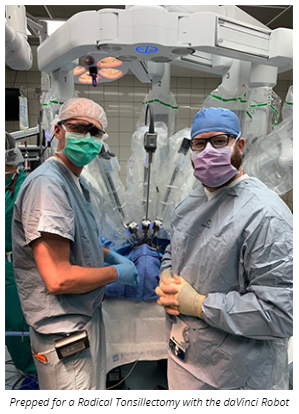The Otolaryngologist’s Role in Diagnosing Complex Head and Neck Conditions
The Otolaryngologist’s Role in Diagnosing Complex Head and Neck Conditions
Blog Article
Checking out the Area of Otolaryngology: What to Anticipate When You Consult an ENT
Otolaryngology, commonly referred to as ENT, includes the diagnosis and treatment of throat, ear, and nose disorders. For those experiencing related issues, consulting an ENT expert can provide clarity and relief. Comprehending what to expect during such examinations is important for effective communication and care. This overview will certainly detail key elements of the ENT experience, consisting of typical factors for sees and the procedures associated with medical diagnosis and therapy.

Comprehending Otolaryngology: An Overview
Otolaryngology, commonly described as ENT (Throat, ear, and nose) medicine, is a customized branch of medication that concentrates on the medical diagnosis and therapy of conditions affecting these essential areas of the body. This field encompasses a large range of conditions, including those related to hearing, equilibrium, respiratory feature, and speech. Otolaryngologists are educated to manage both medical and medical therapies, using advanced strategies and modern technologies. Their experience expands past standard conditions, resolving concerns such as allergies, sinus infections, and hearing loss. Furthermore, they play a vital function in the administration of head and neck cancers, providing detailed treatment tailored to individual person requirements. Generally, otolaryngology remains essential for keeping wellness and lifestyle in damaged people.
Common Reasons to See an ENT Expert
Lots of individuals look for the expertise of an ENT professional for a selection of factors, mirroring the varied nature of problems that impact the ear, nose, and throat. Common issues consist of persistent sinus problems, which usually brings about relentless nasal blockage and facial pain. Allergic reactions and their linked signs, such as sneezing and itching, also prompt brows through to these professionals (Sinus). Hearing loss, whether gradual or sudden, is an additional considerable reason for assessment. Furthermore, people may seek analysis for throat conditions, consisting of persistent hoarseness or ingesting troubles. Rest apnea, characterized by interrupted breathing throughout rest, is regularly attended to by ENT professionals. Each of these problems highlights the significance of specialized care in taking care of intricate ENT-related wellness problems
Preparing for Your ENT Appointment
When planning for an ENT appointment, it is vital to gather appropriate info and consider any type of certain worries. Individuals need to put together a comprehensive case history, consisting of previous ear, nose, or throat issues, surgeries, and present medicines. Documenting signs and symptoms-- such as seriousness, duration, and frequency-- can give valuable insights for the ENT expert. In addition, people ought to prepare a checklist of concerns they desire to ask, making sure that all issues are resolved during the check out. Bringing along any pertinent medical records or examination outcomes can better help the ENT in comprehending the patient's problem. People must confirm their consultation details, consisting of day, area, and time, to minimize any final confusion. Appropriate preparation can enhance the efficiency of the examination and bring about far better end results.
What to Expect During the Assessment
As the examination starts, the person can expect to engage in an extensive conversation with the ENT expert concerning their symptoms and case history. The expert will make inquiries concerning the period, regularity, and seriousness of symptoms such as hearing loss, nasal congestion, or aching throat. In addition, the person's previous medical problems, drugs, and any kind of pertinent household history will certainly be evaluated, aiding the specialist in developing a complete understanding of the patient's wellness. The ENT may also inquire about lifestyle aspects, such as direct exposure to irritants or allergens. This open discussion establishes a structure for the assessment, guaranteeing that the patient's concerns are dealt with and establishing the stage for any required analyses or suggestions for treatment.
Analysis Examinations and Procedures in Otolaryngology
A variety of diagnostic tests and procedures are essential in otolaryngology to properly review and diagnose problems affecting the ear, throat, and nose. Typical examinations include audiometry, which gauges hearing feature, and tympanometry, evaluating middle ear pressure. Nasal endoscopy enables visualization of the nasal flows and sinuses, while laryngoscopy takes a look at the throat and singing cords. Imaging methods, such as CT scans and MRIs, supply detailed sights of head and neck frameworks. Allergic reaction screening may also be conducted to recognize triggers for sinus or respiratory problems. These diagnostic tools allow ENT specialists to develop a detailed understanding of people' conditions, making certain customized and efficient administration strategies. Appropriate medical diagnosis is crucial for successful treatment outcomes in otolaryngology.
Treatment Choices Offered by ENT Specialists
ENT experts supply a selection of therapy choices customized to resolve specific problems impacting the throat, nose, and ear. These treatments range from traditional strategies, such as medication and way of living adjustments, to more invasive procedures. For instance, allergic reactions might be managed with antihistamines or immunotherapy, while persistent sinus problems might require nasal corticosteroids or sinus surgical procedure. For hearing loss, ENT specialists commonly advise listening devices or medical interventions like cochlear implants. In instances of throat problems, choices can include speech therapy or surgical procedures to remove obstructions. Additionally, they may supply guidance for handling rest apnea, including using CPAP tools or surgical interventions. Generally, the objective is to enhance individuals' top quality of life via individualized treatment and effective treatment techniques.
When to Seek Follow-Up Care With an ENT
Acknowledging when to seek follow-up care with an ENT specialist is crucial for taking care of recurring signs and symptoms or issues connected to ear, nose, and throat problems. Individuals should take into consideration scheduling a follow-up appointment if signs and symptoms linger in spite of initial treatment, such as chronic ear pain, nasal congestion, or throat discomfort. Changes in hearing, balance issues, or uncommon nasal discharge may additionally call for further examination. Furthermore, if an individual experiences side impacts from suggested medicines or has actually undertaken a surgery, follow-up treatment is very important to keep an eye on healing and deal with any issues. Timely consultations can assure reliable monitoring of problems, avoid possible problems, and give satisfaction relating to one's wellness. Seeking follow-up treatment advertises proactive wellness administration in otolaryngology.
Frequently Asked Questions

What Credentials Should I Try to find in an ENT Professional?
When looking for an ENT specialist, one ought to look for board accreditation, relevant experience, and solid individual evaluations. Additionally, reliable interaction skills and a caring strategy can substantially improve the general therapy experience.
Just how Do I Select the Right ENT for My Demands?
Choosing the best ENT professional involves assessing their credentials, experience, and person evaluations (Otorrinolaringologia). It is necessary to consider their communication style and method to therapy, ensuring they line up with the person's certain health requirements and choices
Exist Any Dangers Connected With ENT Procedures?
The dangers associated with ENT procedures might consist of infection, blood loss, anesthetic problems, and potential damages to surrounding structures. Individuals must review these risks with their physician to understand individual concerns and guarantee notified choices.
Just How Can I Take Care Of Anxiety Before My ENT Appointment?
To manage anxiety prior to an appointment, individuals can practice deep breathing workouts, envision positive outcomes, prepare concerns ahead of time, and seek assistance from buddies or household, promoting a sense of peace of mind and calmness.
What Should I Do if I Experience Adverse Effects From Treatment?
If negative effects from treatment happen, the individual ought to without delay report them to their doctor. Changes to therapy or extra interventions may be essential to ensure safety and security and effectiveness in managing their condition - ENT Clinic. As the examination starts, the client can expect to involve in an extensive conversation with the ENT specialist concerning their signs and symptoms and clinical history. These diagnostic devices allow ENT professionals to develop a comprehensive understanding of people' problems, ensuring tailored and read more efficient management plans. ENT specialists offer a range of therapy options tailored to attend to particular problems impacting the ear, throat, and nose. When looking for an ENT expert, one must look for board certification, appropriate experience, and strong client evaluations. Selecting the right ENT expert entails evaluating their qualifications, experience, and client evaluations
Report this page